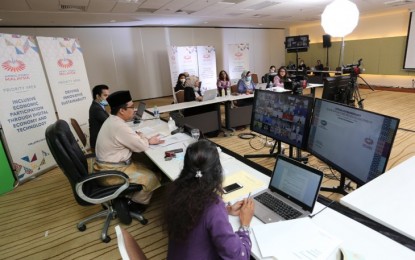
JAKARTA – Asia-Pacific Economic Cooperation’s (APEC) member economies will advance work to fast-track the revitalization of the region’s economy, as mandated in the joint statement on the coronavirus disease 2019 (Covid-19) issued by the APEC Ministers Responsible for Trade.
Senior officials convened virtually on Wednesday to respond to the crisis, identify remedial policy actions, and fulfill directions from APEC’s Trade Ministers, according to a written statement issued by the APEC Virtual Extraordinary Senior Officials’ Meeting and received here Thursday.
Such responses encompass keeping markets open and ensuring a smooth flow of essential goods and services.
"Despite the trying times that we presently face, the work in APEC must go on, by means of virtual meetings, such as this one, or through other intersessional mechanisms," chair of the 2020 APEC Senior Officials Hairil Yahri Yaacob said.
Yacoob said APEC’s broader work in areas, such as trade and investment, business mobility, tourism, food security, sustainable development, customs procedures, standards-setting, and intellectual property rights, will play a critical role in the region’s recovery.
Sentient of the susceptibility of the region’s communities to the current economic slowdown, APEC senior officials joined forces to expedite the development of a set of inclusive policies to accelerate recovery for exposed economic sectors, businesses, and workers.
"This is a crucial juncture for APEC. As we conclude the 2020 goal of free and open trade and investment, the new vision for APEC has to take into account the extraordinary situation we are going through today that will definitely change the way we look at trade and investment and economic growth in the future," Executive Director of the APEC Secretariat Rebecca Sta. Maria said.
Initiatives to facilitate the flow of essential goods, including the reduction of tariffs, were put forth for further deliberation by the senior officials.
The proposal, if adopted, could see lowered tariffs on medical, food, and agricultural products.
According to the APEC Policy Support Unit, promoting trade in medical goods will save lives and strengthen members’ capacity to fight the Covid-19 pandemic.
"We are facing an unprecedented challenge, and we must adapt to the changes brought about by the Covid-19 crisis. If we continue to strengthen the spirit of cooperation between our economies, we will come out of this crisis better and more resilient," Yaacob said.
Intersessional work will continue among APEC Senior Officials, working groups, and fora towards a healthy, resilient, and inclusive Asia-Pacific community.
Earlier this month, the APEC Business Advisory Council (ABAC) urged member economies to refrain from putting any trade-restrictive measures for the rest of this year to ensure access to food and other essential goods.
Senior officials took into account the recommendations from ABAC. (Antara)
